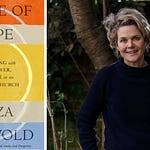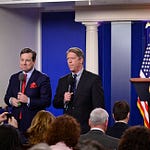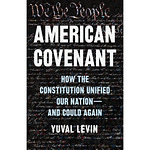This is my second post on Aurelian Craiutu's book Why Not Moderation: Letters to Young Radicals, which was released Oct. 12, 2023. The first post is here.
In June, I went through Yuval Levin's American Covenant
In May, I went through Taylor Branch’s At Canaan’s Edge
In April, I went through John Inazu's book Learning to Disagree.
In March, I went through Mustafa Suleyman’s The Coming Wave.
In February, I went through Nick Troiano’s The Primary Solution.
In January, I went through Michael Wear’s The Spirit of Our Politics.
The book of the month schedule is here.
Here is a lightly edited transcript of my interview with Professor Aurelian Craiutu, chair of the political science department at Indiana University, and author of Why Not Moderation? This interview was conducted last week, before the assassination attempt against former President Trump.
Jon Ward: I wanted to start with your personal background, which you write about in the book a little bit. Can you just go over the brief history of your personal story and how it informs your life's work and how it informs your view of American politics over the past decade up to this moment or so?
Aurelian Craiutu: I did indeed write a little bit about this in the book. Some reviewers would've wanted more. I prefer to be discreet about it, but I think there is an important element here which explains the genesis of the book. So I'm Romanian by origin. I grew up in Romania—I should say communist Romania—which is important because it was on the other side of the Iron Curtain. So early on I saw clearly that ideas have consequences and bad ideas have bad consequences: in this case, the idea of creating a communist society, which led to the development of the Warsaw Pact and explained in good part the Cold War.
I came to the United States when I was 27 years old, so I was kind of formed under communism. I went to school under communism and my intellectual trajectory is unique in the sense that I was privileged to have a private education with a private philosopher. So I had two universities, two college educations at the same time. I had the official one. I was an economist by training, and then I was lucky enough to meet my mentor by the name Mihai. He died last year at the age of 106. He had the long life fascinating trajectory himself.
But I want to go back to the importance of ideas. So I've always been convinced that communism is not a good idea and I've seen younger radicals in the last 10 or 15 years resurrecting ideas that seem to me to be wrongheaded and unjustified. So this is a book that is based on that conviction, that moderation is a virtue, it's not a virtue for everyone, it's not a virtue for all times, and it requires a good dose of courage and nonconformism to be a moderate when others are pushing for radical extreme solutions.
So my background does explain in part my interest in moderation, but I would say that the conceptual interest in moderation stems from my doctoral dissertation, which I defended in 1999 at Princeton, in which I analyzed a group of thinkers after the French Revolution that sought to carve out a middle ground between revolution and reaction.
So there is an intellectual coherence behind my project. I've looked at how moderation evolved in history, and there is a personal justification of the book, which as I said earlier, stems from my education and growing up under communism. This is not to say that I don't have my ideological preferences. I'm a strong believer in the virtues of open society as defined by the philosopher Karl Popper, a society in which you can have transfer of power without violence. And I'm fully committed to the principles of liberal democracy, which means constitutionalism, limited government, and a host of individual rights and liberties. So when I say that I embrace moderation, it doesn't mean that I'm indifferent towards a certain vision of what a distant society looks like. And those two principles — liberal democracy and open societies — are in my view connected to the concept of political moderation.
“We see around us a thirst for simplicity, for panacea, for one size fits all solutions. And trimmers understand that we need to find a way to live in the complexity of the world in which we are destined to live.”
Jon Ward: What was the name of the mentor and how did you meet him? I'm very curious. How old were you when you met your mentor?
Aurelian Craiutu: Fascinating experience. I wrote about it. I can share an article in which I explained my experience. His name was Mihai Sara. He was a philosopher born in 1916. When I met him in 1984, he was 68 years old and he was already retired.
He spent 10 years in France, 1939 to 1948, and then he returned to Romania, was a man of the left at the time, and then seeing communism firsthand kind of cured him of the illusions that he had during his youth. When I met him, he was the owner of a remarkable library and I was able to read from his library books that would not have been possible in the official libraries books, in about six languages. His library was legendary among younger intellectuals in Bucharest.
So I was able to see him almost weekly for about four years, and he would give me some suggestions for what to read, and this is how we proceeded. But it wasn't just a book education, everything was part of that education. We took walks together, we discussed nonpolitical issues, political issues, we met with friends. So it was a comprehensive education. I owe Mihai Sara everything I am today. In many ways it's an experience that I was very lucky to have. And ... we resisted through culture. So by reading books in original – in German, in French, in Spanish, in English — we preserved a modicum of civilization and culture that were threatened because we were living in dark times.

Jon Ward: And he lived under Nazi occupation in Paris, is that correct?
Aurelian Craiutu: He lived under Nazi occupation in France. He and his wife moved from Paris to Grenoble, and he was active in the French resistance in the early 1940s. A fascinating intellectual experience. After the fall of communism in 1990, he was minister of Education for six months in post-communist Romania.
Jon Ward: Professor, I'm curious what your view is of where we find ourselves in American politics right now, from your point of view.
Aurelian Craiutu: I have to say that America today resembles relatively little of the America that I came to in in 1993. So 32 years later, the country seems changed.
How so? Well, polarization has always been a presence in American history, but the kind of toxic polarization that we have today seems to be an overwhelming trait of current politics. I'm prepared to admit that if we compare our political scene today with the one in the 1960s it is probably better, because at least we don't have assassinations today, right? I think the 1960s were the turning point in American history. We're still trying to come to grips with the changes that were made then: major changes in society from political and civil rights to the rise of feminism, liberation of desires.
But it seems to me that today we are a tired country. We're a country that is still looking for a compass after the fall of the Cold War and is a country that needs a boost, needs to rethink its foundations, in many ways to rebuild its civic bridges. Those bridges I see eroded today. We're a country that is at the point where it might come apart. We've heard lots of talks about national divorce, mostly from the right. I hope it'll never happen. I don't think it can happen, but this is a concern that I have today and it's a concern that others have and it's not something that I think was present 32 years ago when I came to this country.
Jon Ward: Yeah. So what does it mean that moderation is a fighting creed? That seems to be one of the main through lines of your work: just emphasizing this idea that moderation is a fighting creed. Why is that so important in your mind?
Aurelian Craiutu: It's important because first we have the image associated with moderation, which is that of being indecisive, lukewarm, wishy-washy. It's important to look at people who embodied this virtue in action. And I did that in a previous book called Faces of Moderation. I look at a number of thinkers from both the left and the right who embodied this virtue. You see that it's a fighting creed. You look at, for example, the case of a Polish dissident. Adam Michnik was born in 1946. Michnik was a major Polish dissident. He embodied the concept of moderation and you see that he fought not always in the name of moderation, but most of the time to build a decent society on the ruins of communism.
But there is also, I would say something commonsensical about moderation that we know is true, which is to say that people in general are not extremists. They resent those who espouse an extremist tone. And there is a kind of commonsensical nature to moderation that makes it worthwhile.
It fights for decency, open society, toleration, acceptance of pluralism and diversity in the good sense of the term. But there's a kind of acceptance that when people choose the middle of the road, they are more likely to have good results, good outcomes. So in that sense, I would say that moderation is a fighting creed.
Moderates like Albert Camus for example in France, radical moderates, fought for justice. They didn't put up with glaring injustices in their society and they denounced abuses of power. Now that takes moderation and that is not only moderates' privilege — to denounce injustice, to fight against infringement of rights and liberties — but the ones that I studied do that courageously.
Jon Ward: The thing that I identify with the most is just this idea that our political engagement should be primarily focused on trying to keep the ship of state together, rather than focused on one particular issue, or this idea that one side should want to have permanent victory. I was very struck by your metaphor of politics as a sailing vessel, and the job of the moderate or the responsible citizen is to really kind of set aside this idea that there's any solution that is once and for all. That was one of the things that really came through to me is that the radical mindset or the zealot mindset is one that is often looking for solutions that will sort of put the issue to rest and end the need for future work, I guess kind of in a quest for the ability to put politics and public work to bed, as if you can ever do that.
But I think the moderate mindset is one of: 'We're on a voyage. There really is no end date. Our job is sort of to constantly look out for the welfare of all, for the welfare of our system and to constantly trim — in sailing terms: to tack, to adjust, sometimes to wait, sometimes to act decisively.' And I just thought the ongoing nature of the metaphor, rather than this idea that anything is ever settled for once for all, was a really important one. Does that metaphor and that stream of thought really kind of reside at the center of things for you as well?
Aurelian Craiutu: Very much so. It is at the core of my vision of moderation that I outlined in this book. There's a long letter on trimming and balance. Both are important, balance and trimming. Now we have to be honest and say that there's nothing new under the sun here. The metaphor of keeping the ship on an even keel comes in the writings of previous thinkers. It goes way back to the ancient authors. But the metaphor itself was used for the first time in a coherent way by the Marquise of Halifax in a classical essay called the Character of a Trimmer in the 1680s. What's interesting here is as you point out, we see around us a thirst for simplicity, for panacea, for one size fits all solutions. And trimmers understand that we need to find a way to live in the complexity of the world in which we are destined to live.
It takes a lot of courage to tell people that grand schemes and abstract theories are dangerous, and you need to go for a piecemeal reform rather than a comprehensive reform.
So we need to find some means of being at home in the complexity we inherited. And this is a fundamental idea in which I strongly believe. But I think this idea is often neglected, in the sense that it's not easy to balance inconveniences, look at different solutions and tell your opponents, or your friends, that political solutions are neither black or white. They are gray. They are sometimes black, sometimes white, but most of the time they are gray. It takes a lot of courage to tell people that grand schemes and abstract theories are dangerous, and you need to go for a piecemeal reform rather than a comprehensive reform. Just a few years ago we had this debate on the Build Back Better, the big blueprint to change many things in our society. And we see this debate reappearing over and over again.
So I think that it's very important to look at trimming as a way of maintaining this complexity, of refusing to simplify. Trimmers as I understand them — and trimmers are moderates — profess and espouse a politics of skepticism. There are skeptics towards grand schemes of improvement and they oppose those who embrace the politics of faith.
Politics of faith doesn't mean necessarily politics of religious faith. It can overlap with that. But faith in abstract theories, in comprehensive grand scale reforms. Trimmers also refuse the litmus test of ideological purity. For trimmers, it's possible to work with people of different ideological persuasions. It's not my tribe versus your tribe, or my way or the highway. They have a good understanding of past experience, and the fact that politics is a complex activity, but also a limited activity.
Not all aspects of our lives ought to be or can be politicized. There are things that remain beyond the realm of politics. And we've seen in the last 20 plus years — maybe 60 years as I was suggesting earlier – that what's personal is political, and what's political is personal. And I think trimmers oppose this conviction. They believe that there are certain things that remain beyond the realm of politics. Politics is a limited activity: precisely what you said at the beginning, keeping the ship of the state on an even keel. So when the ship of the state threatens to capsize, they lean either leftwards or rightwards to bring it back on an even keel.
Note: At the end, I ask Prof. Craiutu about a quote from Baltasar Gracian (1601-1658), a Jesuit priest and writer who was "one of the greatest Spanish moralists" (175). Gracian wrote a book of aphorisms on prudence, and one of them was: "We must use human means as though divine ones didn't exist, and divine means as though there were no human ones." It seems like it's a version of the saying, "Pray like it depends on God and work like it depends on you." But I ask Craiutu about the intersection of public life and faith in the last several minutes. We don't fully develop that part of the conversation, but it may be of interest to you.
Thanks for reading!










